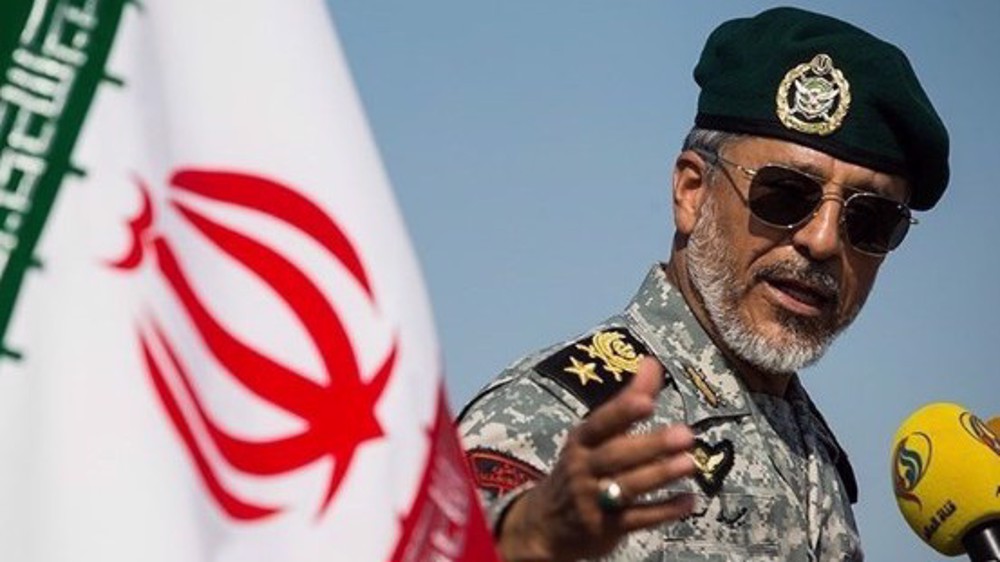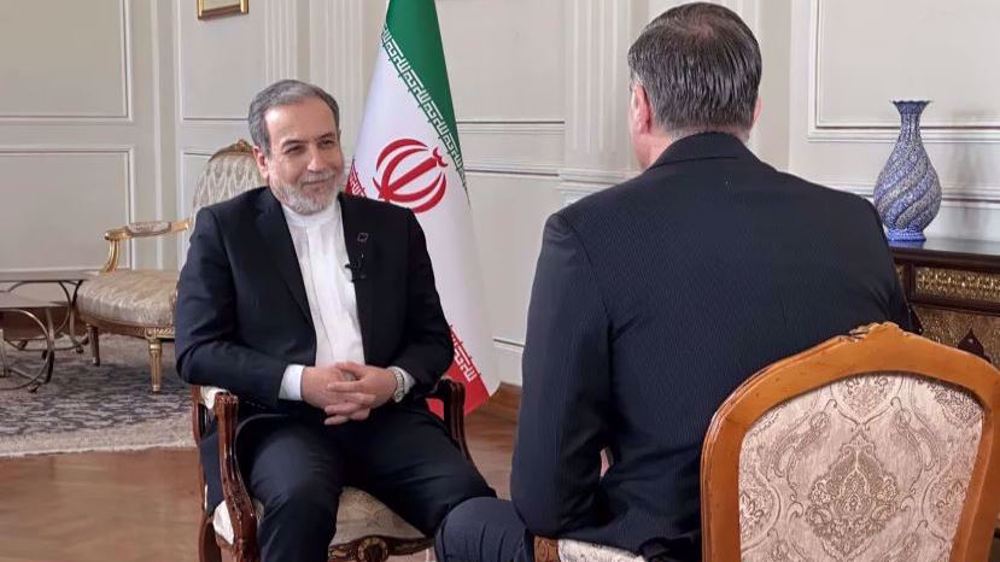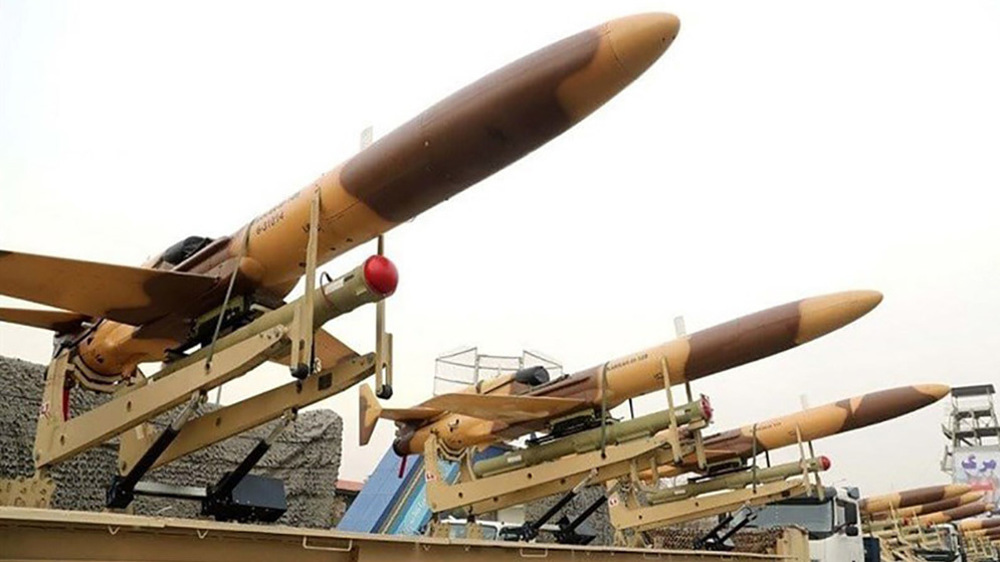Iran FM rules out military approach to Syria crisis
Iranian Foreign Minister Mohammad Javad Zarif says military approaches will fail to resolve the Syrian crisis, stressing that military intervention of certain countries has only prolonged the sufferings of people in the war-stricken state.
Zarif was speaking at a joint news conference with his Russian and Turkish counterparts Sergei Lavrov and Mevlut Cavusoglu, respectively, on Saturday in Moscow, where the three top diplomats, whose countries act as guarantors of the Syria ceasefire, discussed the latest developments in Syria.
After the launching of the Astana peace process some 16 months ago, Tehran, Ankara and Moscow made attempts to alleviate the Syrian people's sufferings and find a political solution to the Arab country's crisis, he said.

He added that the process was still the only option to restore peace to Syria with the help of the United Nations.
"We have announced since the outset that [the crisis in] Syria has no military solution and that the sides must focus on a political solution," Zarif pointed out.
The Astana peace talks, which have usually involved delegations from the Syrian government and opposition, began in January 2017 with the mediation of Russia and Iran, two Syria's allies, as well as Turkey, which backs several armed opposition groups operating against Damascus.
The presidents of Iran, Russia and Turkey on April 4 reaffirmed their commitment to work toward achieving a sustainable ceasefire between the warring sides in Syria and bringing peace and stability to the war-torn Arab country.
Iran’s Hassan Rouhani and his Russian and Turkish counterparts, Vladimir Putin and Recep Tayyip Erdogan, “reaffirmed their determination to continue their active cooperation on Syria for the achievement of lasting ceasefire between the conflicting parties and advancement of the political process envisaged by UN Security Council Resolution 2254,” said a joint statement issued at the end of the meeting of the three leaders in Ankara.
The Iranian foreign minister also criticized a US-led military attack against Syria earlier this month and said, "The Islamic Republic of Iran, as the biggest victim of chemical weapons, condemns any use of chemical arms."
He expressed hope that an objective international investigation on the ground in Syria by the Organization for the Prohibition of Chemical Weapons (OPCW) would lead to results as soon as possible.
He said those countries, which supported Iraq during its use of chemical weapons against Iran, have no right now to accuse the Syrian government.
Western states blamed the Syrian government for the suspected chemical weapons attack in the Damascus suburb town of Douma on April 7.
One week after the incident, the US, Britain and France launched a coordinated missile attack against sites and research facilities near Damascus and Homs with the purported goal of paralyzing the Syrian government’s capability to produce chemicals.
Syria has rejected the accusations of possessing chemicals. It surrendered its chemical stockpile in 2013 to a mission led by the OPCW and the UN.
A Syrian official said on Thursday that Syria's government forces had discovered a depot of German and UK-manufactured chemical weapons left by terrorists in Douma.
"In the depot with chemical weapons left by terrorists in Douma, we have found chemicals from Germany, the United Kingdom, from the Porton-Down laboratory in Salisbury," Russia's Sputnik news agency cited Syria's Deputy Ambassador to the OPCW Ghassan Obaid as saying after a briefing in The Hague.
Read more:
- UN, EU hold conference to gather more aid for Syrian people
- US-led military strikes will fail to stop Syria's terror fight: Assad
- OPCW inspectors enter Douma to probe alleged gas attack: Russia
The top Iranian diplomat further said the Islamic Republic has played a role in fighting terrorist groups such as Daesh and Jabhat Fateh al-Sham, formerly known as al-Nusra Front, but the US has always had a destructive role and sowed discord among various factions and groups in Syria.
Zarif also criticized US President Donald Trump's demands regarding a multilateral nuclear agreement, officially known as the Joint Comprehensive Plan of Action (JCPOA), signed between Iran and the P5+1 group of countries in 2015.
He said Trump has always opposed the deal and UN Security Council Resolution 2231, which endorses the JCPOA, and has today excessive demands "which are neither acceptable to us nor to other members [of the P5+1 countries]."
The US president is a stern critic of the nuclear deal, reached between Iran and the five permanent members of the UN Security Council -- the United States, France, Britain, China, Russia - plus Germany.
Under the agreement, nuclear-related sanctions put in place against Iran were lifted in exchange for curbs on Tehran's nuclear program.
In January, the US president decided to stick with the JCPOA, but gave the European signatories a May 12 deadline to “fix the terrible flaws” of the accord or he would withdraw Washington from the deal.
Read more:
- China vows to step up effort to safeguard, implement Iran nuclear deal
- France won't leave Iran nuclear deal, Macron tells US Congress
- 'Either all or nothing' on Iran nuclear deal: Zarif
- Iran's response readiness will startle US if it pulls out of JCPOA: Salehi
US-led military attack aims to reformat Middle East, divide Syria: Lavrov
The Russian foreign minister said the US, France and Britain carried out airstrikes against Syria before the OPCW investigation.
Lavrov added that the military attack "seriously aggravated the situation," and indicated that US claims about supporting Syria's territorial integrity were "only words which, apparently, cover plans for reformatting the Middle East and dividing Syria into parts."

He said Russia, Iran and Turkey are resolute in their agreement on "the absolute inadmissibility of attempts to divide Syria along ethno-confessional lines."
Lavrov emphasized that peace efforts should not be accompanied by any preconditions as they are "highly destructive" and aimed at complicating the resumption of the negotiation process.
He noted that the UN can play a major role in helping the Astana process develop in several key directions such as assistance with the ceasefire regime in the de-escalation zones.
Turkey supports Syria's territorial integrity: Cavusoglu
For his part, the Turkish foreign minister reiterated his country's support for Syria's territorial integrity.
Cavusoglu said the common goal of the three guarantor countries was to dispatch humanitarian aid to Syria and ultimately find a political solution to the country's crisis.

He warned that "some groups" are making efforts to undermine the Astana peace talks and emphasized that the guarantors would continue their work and cooperation.
The top Turkish diplomat urged every actor in the international community, including those trying to torpedo the political process, to contribute to the political process instead.
Former CIA chief admits US 'directly helped' rioters in Iran
Iran to unveil new homegrown satellite, space center on Space Technology Day
‘No American will be safe’: Iran’s top general warns against any mischievous act
Scores of Baloch militarnts killed in Pakistan after deadly attacks
Anonymous ‘doctor’ claim of 30,000 deaths in Iran riots debunked
#IR47: From fear to awe – How Western media covered Imam Khomeini’s triumphant return in 1979
Enemy aims to restore lost domination over Iran: Senior commander
Israel to ban Doctors Without Borders from operating in Gaza











 This makes it easy to access the Press TV website
This makes it easy to access the Press TV website